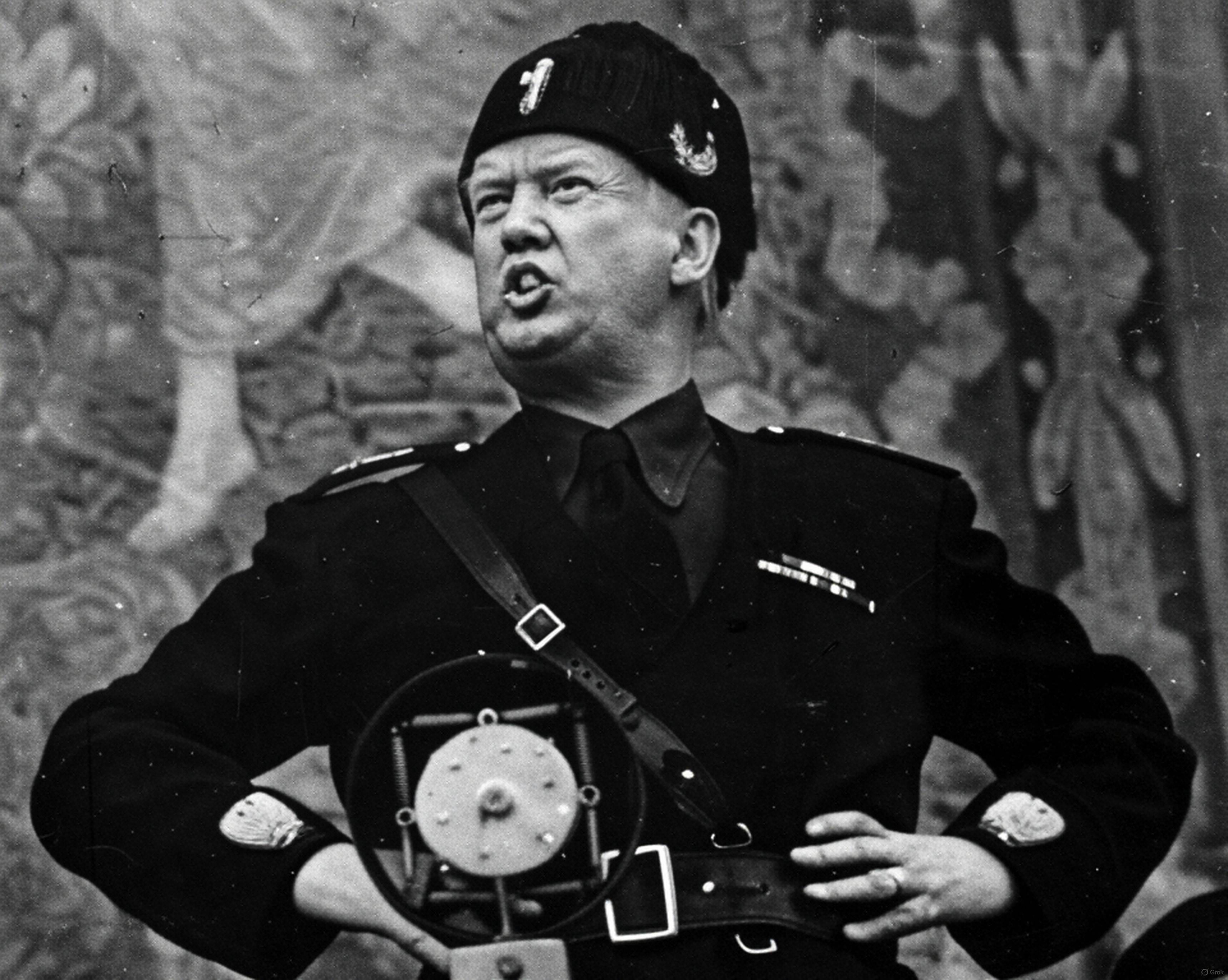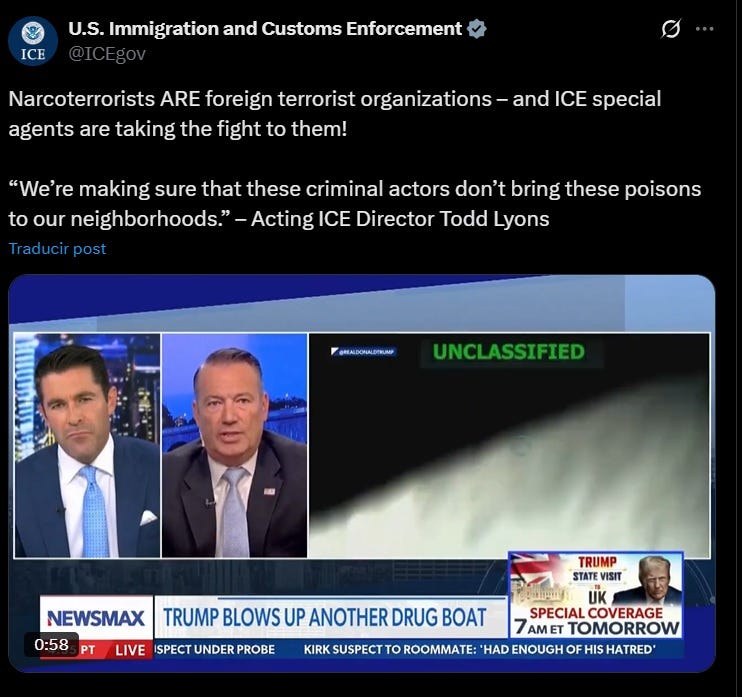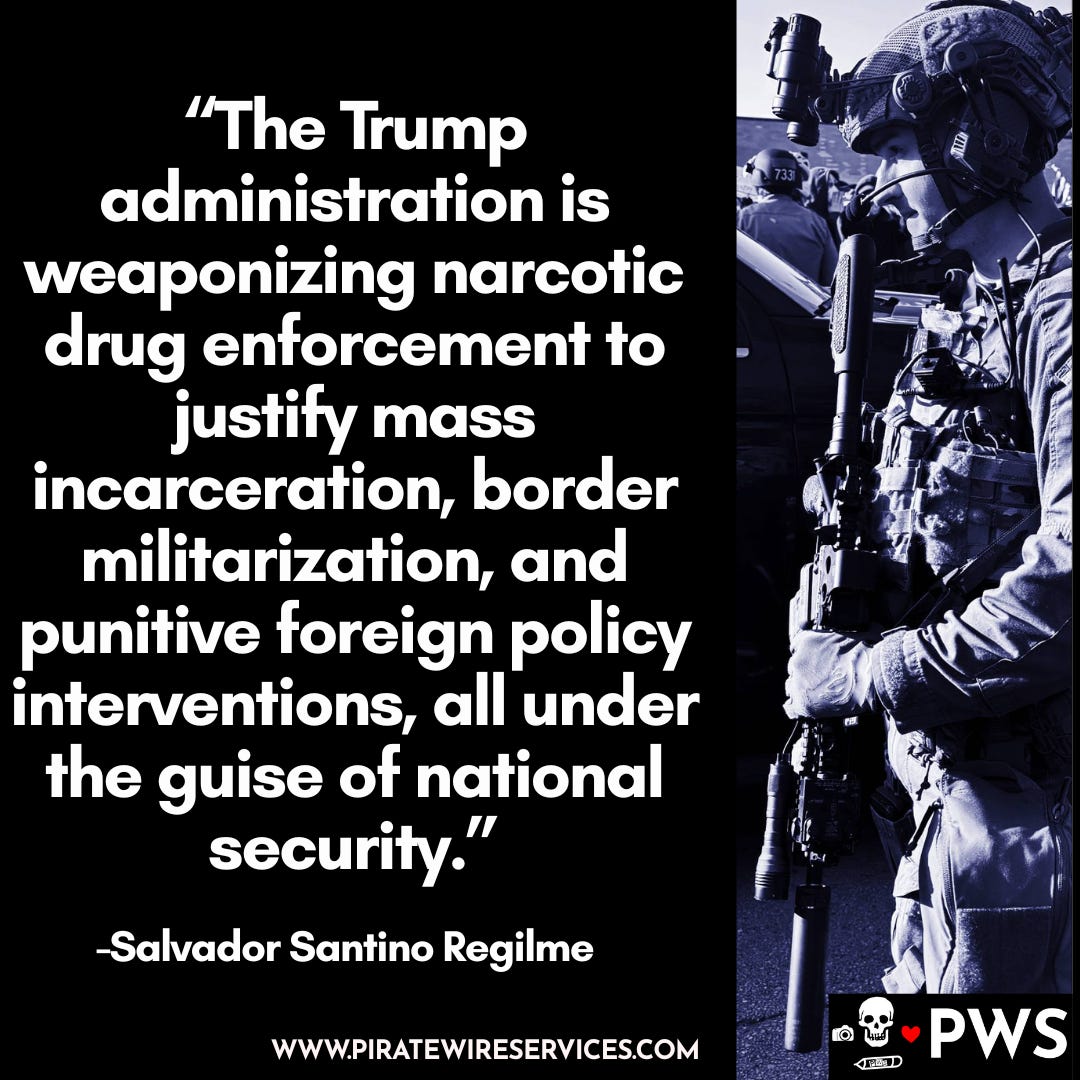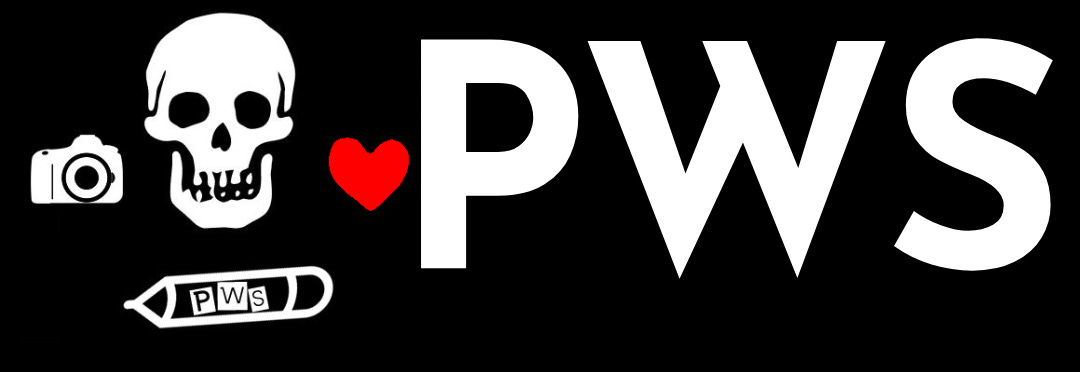Trump brings the 'War on Terror' to America: it's a recipe for totalitarianism
The 'Wars' on terror and drugs are being brought to bear on internal and external enemies alike
The announcement of another US strike on a civilian vessel near Venezuela brings the total killed by US actions in the Caribbean to at least 21 people. The bombings, which some legal experts have described as extrajudicial executions, are the latest in a series of attempts by US President Donald Trump to expand presidential power by bringing the “War on Terror” to the Americas.
Shortly after announcing the attack, Trump claimed on social media that the boat was “loaded with enough drugs to kill 25 TO 50 THOUSAND PEOPLE” and implied it was “entering American Territory” (it was 1,600 miles from Florida).
This is the fourth such strike officially announced to the public by the US government, although Trump, in comments to the press after the second strike, claimed there was another strike that the media was unaware of at the time.
Both Trump and his Secretary of War, Pete Hegseth, described the targets as “narco-terrorists.” They provided no proof of their accusations.
US officials have increasingly used “terrorism” rhetoric against organized crime groups in the region. The Trump administration has designated more than 10 criminal organizations in the region as foreign terrorist organizations (FTOs).
On Oct 2, the White House notified Congress that the Trump administration considers drug cartels “unlawful combatants” and “terrorists,” with which the United States is engaged in “non-international armed conflict.”
Trump has repeatedly claimed that cartels are effectively waging war on the US, and is now arguing that the designation as FTOs grants him broad war powers.
Drugs are “killing hundreds of thousands” of people in the US, he has stated in press briefings and in social media posts, comparing cocaine and fentanyl to “weapons of mass destruction.”
Taken together, all of these actions define a new hybridization of two long-running justifications for violent US actions abroad: the ‘War on Drugs’ and the ‘War on Terror.”
Strategies and tactics developed by previous US administrations in both spheres are now being used in conjunction in the Americas. And, like previous administrations, they are being used to expand executive power. Trump, however, is taking that expansion of his power to new levels and bringing those wars home to the US.
Migrants are ‘terrorists’
“Terrorism” rhetoric has been deployed domestically in the US against migrants and even US citizens. On the first day of his second term, President Trump issued a proclamation falsely declaring informal migration across the U.S. southern border an “invasion.”
White House Deputy Chief of Staff Stephen Miller, responding on social media to litigation over the erroneous and apparently unlawful rendition of a Salvadoran man, Kilmar Abrego Garcia, to CECOT, asserted that the “alien was a member of a designated terrorist organization, ineligible for any form of relief under the law. The only process he was entitled to was deportation.”
Secretary of State Marco Rubio has repeatedly called Garcia a “terrorist.” The Department of Homeland Security (DHS) stated, falsely, that Garcia is a “MS-13 gang member, human trafficker, serial domestic abuser, and child predator.”
US officials have also been long fixated on the Tren de Aragua, a Venezuelan gang that multiple administration officials have claimed is “invading” the US. The DHS recently used the Tren as justification for a raid in Chicago in which US citizens, including women and children, were ripped from their homes without warrants, zip-tied, and held for hours.
The Trump administration has “framed drug-related crime as a moral and existential threat, scapegoating poor, Black, and Latinx communities while expanding policing, incarceration, and border enforcement,” writes Salvador Santino Regilme, a researcher at Leiden University, in a recent academic article on Trump’s drug policies.
“The Trump administration is weaponizing… drug enforcement to justify mass incarceration, border militarization, and punitive foreign policy interventions,” he writes, explaining that the policies are carried out under the guise of national security.
Domestic opponents as ‘terrorists’
“The Trump administration is also regularly using the rhetoric of counter-terrorism against the president’s domestic political opponents,” says Brian Finucane, senior US advisor for the International Crisis Group. And in so doing, “it is claiming authority to wield broad, weakly constrained power at home and abroad.”
Multiple Trump administration officials have utilized anti-terrorism rhetoric to disparage domestic political opponents. Stephen Miller has publicly stated that “the Democrat Party is not a political party. It is a domestic extremist organization.”
On September 22, the White House announced that it was designating “Antifa” a “terrorist threat.” In the written statement, Trump claimed that the organization is “a militarist, anarchist enterprise that explicitly calls for the overthrow of the United States Government, law enforcement authorities, and our system of law.”
Much ink has been spilled by big-name columnists and analysts over the fact that Trump doesn’t have the power to legally declare anyone a domestic terrorist organization. But they’re missing a crucial point: it doesn’t matter.
He just did. “Antifa,” which just means “anti-fascist”, could be anyone. And he is stating, in blunt terms, that he views anyone who opposes him, including US citizens, as existential enemies.
In light of how he is treating other civilians that he considers to be “terrorists,” that is extremely concerning to say the least.
The ‘internal enemy’
The current Trump project — the conflation of terrorism, drug policy, and domestic dissent — is one that started in his first term in office. As part of his rhetoric against migration at the time, Trump often blamed migrants for bringing fentanyl into the US.
Data from the Drug Enforcement Administration (DEA) contradicts this assertion. The vast majority of intercepted narcotics entered the U.S. through legal ports of entry, hidden in shipping containers, boats, vehicles, or aircraft — not carried by migrants.
Nonetheless, even while pondering privately about bombing cartels in Mexico, Trump tasked DHS with drug enforcement, both in practice and rhetorically.
“By making DHS a key player in drug enforcement,” writes Regilme, “the Trump administration elevated militarized state intervention as the primary tool for addressing narcotics-related issues.”
He also argues tactics from the ‘War on Drugs’ were increasingly being conflated with the ‘War on Terror,’ and he wrote those words in February, long before Trump bombed civilian boats in the Caribbean.
We’ve seen this before
In the 1920s, marshalled by Benito Mussolini, fascism rose to power in Italy. It did so by demonizing, intimidating, and even using violence against what people in the US today would call “the far left” — socialist, anarchist, and communist labor unions, political parties, and community organizations.
Fascists described these organizations as an internal enemy that represented an existential threat to the Italian nation, as were “foreign infiltrators”. The word “terrorism” wouldn’t become part of common political parlance for another half-century, but if it had been, they certainly would have called leftists that as well.
“This is heroism…This is the violence of which I approve.” Mussolini said.
At the time, fascist forces were supported by conservatives and largely unresisted by establishment liberals. That would quickly change.
A perception among the public of internal and external enemies has always been a key element to the rise of authoritarianism, wherever and however it has arisen. A population that is in fear, or convinced they are facing a crisis, is far more susceptible to surrendering their liberties to a would-be strongman.
In blending migration, drug, and “terrorism” policies, Trump isn’t merely straining executive power in the US to its very limits — he is creating a host of enemies for his supporters, both internal and external.
The US political system hasn’t been completely overtaken by resurgent fascism yet. But that’s where it’s headed. And fast. Trump’s versions of the blackshirts, the paramilitary organization that brought Mussolini to power in Italy, already exist. He just gave them a $75 billion pay raise.
And the importation of US ‘wars’ on terror and drugs, which have long been dark elements of the country’s foreign policy, is his fascist vehicle for doing so.
You can also donate a one-time gift via “Buy Me a Coffee”. It only takes a few moments, and you can do so here.
And if you can’t do any of that, please do help us by sharing the piece! We don’t have billionaire PR teams either.







